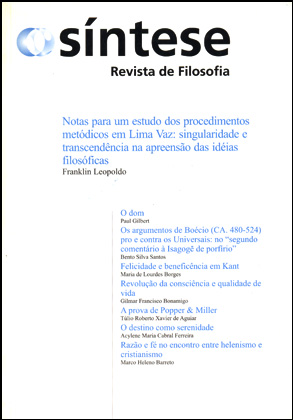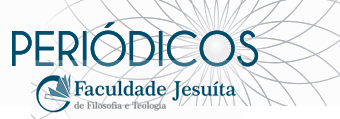OS ARGUMENTOS DE BOÉCIO (CA. 480-524) PRO E CONTRA OS UNIVERSAIS NO “SEGUNDO COMENTÁRIO À ISAGOGE DE PORFÍRIO”
DOI:
https://doi.org/10.20911/21769389v30n97p187-202/2003Palavras-chave:
Boécio, Porfírio. Pluralidade, Universais.Resumo
O artigo tem em vista examinar o célebre texto de Boécio sobre sua discussão dos Universais no Segundo Comentário à Isagoge de Porfírio. O problema medieval sobre os Universais tem início precisamente com as próprias observações de Boécio feitas a uma passagem da Isagoge de Porfírio. De um lado, retomando as distinções de Porfírio consignadas em uma outra obra (Comentário à s Categorias de Aristóteles segundo perguntas e respostas) acerca do termo “communis”, Boécio as aplica ao problema dos Universais e elabora a seguinte crítica: a pluralidade das coisas à s quais um universal, supostamente, julga ser comum é “contagiosa” e “infecta” o próprio universal, tornando-o também múltiplo, e assim não “uma só coisa”. De outro, Boécio propõe uma teoria a favor dos Universais, segundo a qual a formação de conceitos universais e gerais sobre o mundo tem uma base objetiva, mas não arbitrária, a saber: os gêneros e as espécies só “existem nos indivíduos, mas são pensados como universais”.
Abstract: The article aims to examine the most well known text of Boethius about the Universals in the Second Commentary on Porphyry's Isagoge. The Mediaeval Problem of Universals starts precisely with Boethius's own observation about Porphyry's Isagoge. On one hand, considering the distinctions done by Porphyry, and recorded in another work (“Exposition of Aristotle's Categories by Question and Answer” ) about the term “communis”, Boethius applies them to the Problem of Universals and works out the following criticism: the plurality of things to which a universal is supposed to be common is somehow “contagious” and “infects” the universal itself, making it plural too, and so not “one”. On the other hand, Boethius proposes a theory for the Universals, according to which the formation of our universal or general concepts about the world has an objective, non-arbitrary base, as follows: genera and species “exist, to be sure, in singulars, but they are thought of as universals”.






























